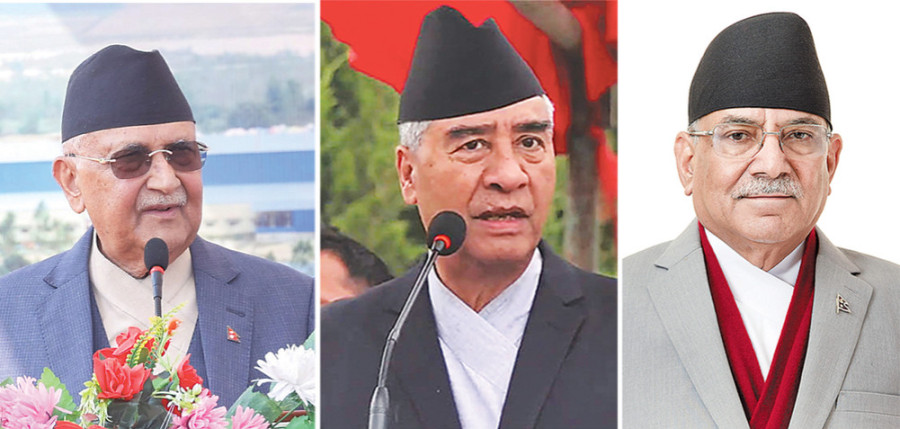National
Even after the revolution, reform in major parties seems a long way off
Traditional forces Congress, UML and Maoist Centre still not ready to replace their leaders.
Post Report
Despite calls for drastic reforms and an overhaul in major political parties following the Gen Z movement, the country’s three major political parties—the Nepali Congress, CPN-UML and CPN (Maoist Centre)—appear very reluctant to make fundamental changes.
Neither they are ready to overthrow their present leadership, a key demand of the Gen Z protesters, nor do they appear to be taking any major action to ending endemic corruption in the country.
After the changes of 1990 and 2006, the Congress, the UML and the Maoist Centre have mostly led the governments by turns—without much to show for it. This bred discontent among the public.
On the occasion of Constitution Day on Friday, Nepali Congress, the largest party in the dissolved House of Representatives, held a meeting. But there was no hint of a drastic change in its functioning, let alone a commitment to honour the spirit of the Gen Z movement, according to Congress leaders privy to the discussions.
In the meeting, General Secretary Gagan Thapa proposed a regular or Special General Convention of the party. The idea was reportedly backed by several others including fellow General Secretary Bishwa Prakash Sharma, and senior leaders Shekhar Koirala, and Bimalendra Nidhi.
The central executive committee had been convened to discuss the situation following the Gen Z movement. Thapa stressed at the meeting that the party’s transformation is essential, which was also demonstrated by the recent youth-led movement.
Thapa emphasised the need for self-reflection, introspection, and the commitment to acknowledge past mistakes and weaknesses, and to fundamentally transform and restructure the party.
Congress President Sher Bahadur Deuba and his wife, Arzu Rana Deuba, are undergoing treatment at the Nepal Army Hospital, Chhauni after they were attacked by a mob at their home on September 9.
The meeting was informed that Deuba was stabbed in the back of his head and neck but can now speak and walk slowly.
Several Congress leaders are said to have rejected Thapa’s proposal for an early convention and put forth their suggestions.
The meeting also condemned the House dissolution and called for a probe into the arson and vandalism of public and private properties during the Gen Z protests.
The meeting made no decision on leadership change or a special convention, said Min Bishwakarma, head of the Congress publicity division. If someone calls for a special convention or change in the party leadership, they might be their “personal opinions”, he said.
“In this context, we need to stay united,” Bishwakarma added.
The party’s Friday discussion indicates that “we are not going to adopt any change, and this disappoints us,” a central committee leader said.
The situation in the CPN-UML is no different.
UML Chairman KP Sharma Oli, who took shelter in the Nepali Army’s Shivapuri barracks after Gen Z protesters stormed the prime minister’s Baluwatar residence on September 9, made a public appearance in Gundu, Bhaktapur, on Friday.
Oli had to resign as prime minister following the killings of 19 people in police firings on September 8 and the failure to protect buildings of vital state institutions such as Parliament, the executive and the judiciary. The death toll from clashes over two days has reached 74.
Issuing a statement on Friday, Oli claimed that no order was given to security forces to shoot protesters in the head and chest and that bullets that hit them were not fired by Nepal Police. There was huge infiltration, he claimed.
Despite public outrage, UML leaders say the party might not seek Oli’s alternative as its leader. Protesting youths have demanded the arrest of Oli, then-home minister Ramesh Lekhak and others responsible for killing innocent students and other people during the Gen Z protests.
Speaking at a UML function in Nuwakot, deputy general secretary Pradeep Gyawali asked everyone to stop attacking the party’s leadership.
Gyawali was of the view that such attacks were being made from different quarters. “We should not trust rumours. The party chair has just come out from the [Army’s] security protection… the way a narrative is built against the party leadership, that should stop,” said Gyawali.
Separately, after the Gen Z movement, calls are growing inside the CPN (Maoist Centre) to hand over the party's leadership to a younger generation. Party deputy general secretary Janardan Sharma leads the chorus but Pushpa Kamal Dahal refuses to vacate the chair for second-rung leaders.
In his Constitution Day remarks on Friday, Dahal said he is considering handing over the party’s leadership by “completing a procedure”.
“During the recently concluded standing committee meeting, I had announced that I will hand over the leadership following the due process,” said Dahal. “I would like to recall those words on this historic day.”
“Without weakening our party’s legacy, pride and the standards we have set, and without undermining the unity and centralisation of our party, there should be a discussion on leadership transition. It may sound surprising to you, but I have already stated in the Standing Committee that I, the party chairman, must take this discussion forward.”
Dahal added that all communist revolutionaries, leaders, and cadres of the Maoist Centre must consider the method, procedure, and timing of this leadership transition.
The situation in the newest Rastriya Swatantra Party is also not good. After Sumana Shrestha resigned from the party, another woman leader and former lawmaker, Toshima Karki, has now strongly raised her voice for drastic reforms in the party’s functioning.




 19.12°C Kathmandu
19.12°C Kathmandu













